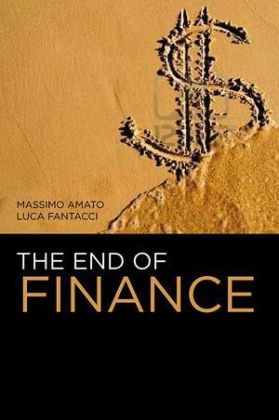Share
Fr. 40.90
M Amato, Massimo Amato, Massimo Fantacci Amato, Amato Massimo, Luca Fantacci, Fantacci Luca
End of Finance
English · Paperback / Softback
Shipping usually within 3 to 5 weeks
Description
Informationen zum Autor MASSIMO AMATO is a Researcher in Economic History at the Università Bocconi in Milan. LUCA FANTACCI is Assistant Professor at the Università Bocconi in Milan. Klappentext This new book by two distinguished Italian economists is a highly original contribution to our understanding of the origins and aftermath of the financial crisis. The authors show that the recent financial crisis cannot be understood simply as a malfunctioning in the subprime mortgage market: rather, it is rooted in a much more fundamental transformation, taking place over an extended time period, in the very nature of finance.The 'end' or purpose of finance is to be found in the social institutions by which the making and acceptance of promises of payment are made possible - that is, the creation and cancellation of debt contracts within a specified time frame. Amato and Fantacci argue that developments in the modern financial system by which debts are securitized has endangered this fundamental credit/debt structure. The illusion has been created that debts are universally liquid in the sense that they need not be redeemed but can be continually sold on in increasingly extensive global markets. What appears to have reduced the riskiness of default for individual agents has in fact increased the fragility of the system as a whole.The authors trace the origins of this profound transformation backwards in time, not just to the neoliberal reforms of the 1980s and 90s but to the birth of capitalist finance in the mercantile networks of the sixteenth and seventeenth centuries. This long historical perspective and deep analysis of the nature of finance enables the authors to tackle the challenges we face today in a fresh way - not simply by tinkering with existing mechanisms, but rather by asking the more profound question of how institutions might be devised in which finance could fulfil its essential functions. Zusammenfassung * This is a work of real quality on an immensely important topic - i.e. why the current financial crisis came about and what we can and should do to reform the financial system. Inhaltsverzeichnis Introduction Part One: Phenomenology I. Do we know what the financial markets are? II. At the root of the possibility of crisis: liquidity and risk III. What is credit? IV. What is money? V. Finance starting from the end VI. Capitalism and debt: a matter of life and death Part Two: History I. From credit risk to liquidity risk (2008) II. The globalization of capital (1973) III. 'Fiat dollar'. And the world saw that it was good (1971) IV. The Eurodollar chimera (1958) V. The European Payments Union (1950) VI. Bretton Woods: the plan that might have made it (1944) VII. Bretton Woods: the system that found implementation (1944) VIII. The crisis paradigm (1929) IX. Orchestra Rehearsal X. Money before and after the gold standard (1717) XI. The Bank of England and power currency (1694) XII. The International Currency of the Trade Fairs (1579) Part Three: Politics I. Double or quits? II. The way out of liquidity: the Gordian knot and utopia III. Prevention or cure? The structural paradox of the anti-crisis policies IV. The other finance V. The (rare) "green shoots" of a possible reform VI. If not now, when?...
List of contents
Introduction
Part One: Phenomenology
I. Do we know what the financial markets are?
II. At the root of the possibility of crisis: liquidity and risk
III. What is credit?
IV. What is money?
V. Finance starting from the end
VI. Capitalism and debt: a matter of life and death
Part Two: History
I. From credit risk to liquidity risk (2008)
II. The globalization of capital (1973)
III. 'Fiat dollar'. And the world saw that it was good (1971)
IV. The Eurodollar chimera (1958)
V. The European Payments Union (1950)
VI. Bretton Woods: the plan that might have made it (1944)
VII. Bretton Woods: the system that found implementation (1944)
VIII. The crisis paradigm (1929)
IX. Orchestra Rehearsal
X. Money before and after the gold standard (1717)
XI. The Bank of England and power currency (1694)
XII. The International Currency of the Trade Fairs (1579)
Part Three: Politics
I. Double or quits?
II. The way out of liquidity: the Gordian knot and utopia
III. Prevention or cure? The structural paradox of the anti-crisis policies
IV. The other finance
V. The (rare) "green shoots" of a possible reform
VI. If not now, when?
Report
"This is an important book. It is clearly destined to become one of the very best accounts of the financial crisis -
it is clear, concise and very readable. Its deep theoretical understanding of the issues is combined with the best
short account of the historical evolution of the capitalist financial system that I have encountered. The result is a
sophisticated and accessible analysis of how a better financial system might be constructed."
- Geoffrey Ingham, University of Cambridge
Product details
| Authors | M Amato, Massimo Amato, Massimo Fantacci Amato, Amato Massimo, Luca Fantacci, Fantacci Luca |
| Publisher | Polity Press |
| Languages | English |
| Product format | Paperback / Softback |
| Released | 14.10.2011 |
| EAN | 9780745651118 |
| ISBN | 978-0-7456-5111-8 |
| No. of pages | 300 |
| Dimensions | 153 mm x 228 mm x 25 mm |
| Subjects |
Social sciences, law, business
> Business
> Economics
Wirtschaftstheorie, Volkswirtschaftslehre, Economics, Economic Theory, Economic and financial crises and disasters, Finance and the finance industry, Finance, regulation |
Customer reviews
No reviews have been written for this item yet. Write the first review and be helpful to other users when they decide on a purchase.
Write a review
Thumbs up or thumbs down? Write your own review.

